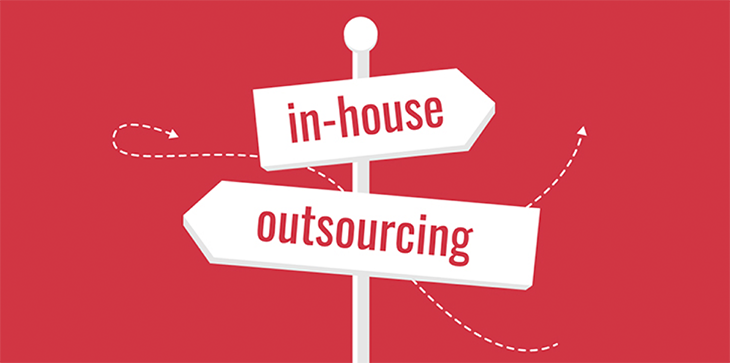‘Will the in-house team be able to manage it or it’s better I outsourced it?’ Outsourcing is a question debatable enough to put you in a state of a dilemma! No matter if you are a project manager or the founder yourself, there’s no definite answer to the question.

Yes, it’s true that outsourcing your project can be a risky trade. But what if we told you that over 78% of businesses around the world feel positive about their third-party partners? Similarly, some organizations have had terrible working experience with their offshore outsourcing product development.
While the struggle might just be very real, we are here to help! This piece aims to decode the decade-old dilemma of ‘in-house vs. outsourced software development.’ Let’s get started…
In-house vs. Outsourced Software Development: In-depth analysis
Key Advantages and Potential Risks of Outsourcing:
1. Advantages:
- Dramatic cost reduction: Sourcing and recruiting talented developers can be a costly affair. Outsourcing saves you from the miscellaneous costs involved in full-time hiring.
- Ease of scalability: When you aren’t committed to a fixed bandwidth, you can easily scale up or down the size of your team. This way, outsourcing product development gives you flexibility in operations.
- Access to a more market-ready product: With a professionally talented team that knows their trade, you can significantly reduce the time behind fixing the bugs of your product. Outsourcing app development helps you receive a market-ready product.
2. Disadvantages:
- Limited transparency of operations: Let’s accept it, you can’t practice control over a team that is working over the cloud. Still, don’t forget that such third-party software developer teams operate with management standards, creating a standard follow-up as and when required.
- Hurdles in communication: This is perhaps self-explanatory; it is always easier to reach out to an on-site team than it is to an offshore team. However, you can tackle this hurdle by maintaining one single channel of communication.
Key Advantages and Potential Risks of In-housing
1. Advantages:
- Efficient operations: With an in-house team at your disposal, you can surely ensure maximum efficiency at operations. Further, it aids better resolution time of any problems midway.
- Proper communication: An in-house team brings you structured work and clear communication. You can reach out to the responsible employee in real-time.
2. Disadvantages:
- Increased costs of operations: The cost of hiring developers with a specific skill set is undoubtedly higher when expected than to hourly rates of a remote team.
- Low retention rates: The higher demand for the required skill set and the competitive market make it impossible to retain talent for long. You are in continuous fear of losing your lead manager.
When Should I Outsource my Project?
The reasons to work with a third-party outsourcing team are pretty simple:
- Your team lacks the required skill set for such a task.
- You want to take a more cost-effective approach towards the project.
- You want to deliver a market-ready product.
How to Outsource and Not to Fail?
Here are your key takeaways to be the smart entrepreneur and manage your outsourcing product development smartly!
- Stay alert around those hourly rates.
- Ensure that you check their past works.
- Run a background check around your outsourcing software product development
- Protect your data via necessary legal agreements.

Dilemma? Now no more!
Looking at the perks, it adds, working with an outsourcing product development is worth the try. However, it’s only up to you to decide whether you’d like your project outsourced or get it done by your team. Whatever the situation be, we wish you all the best!









































